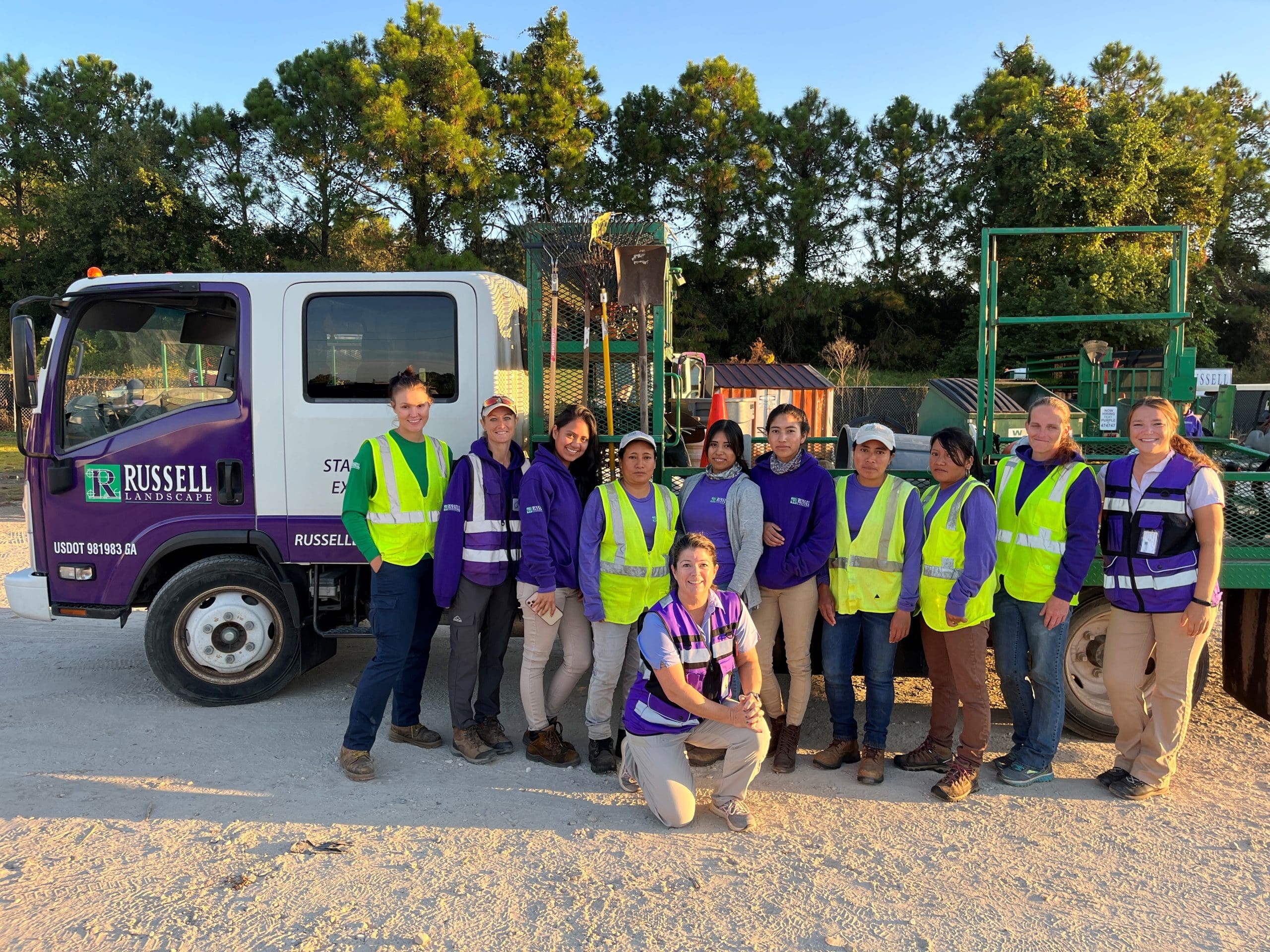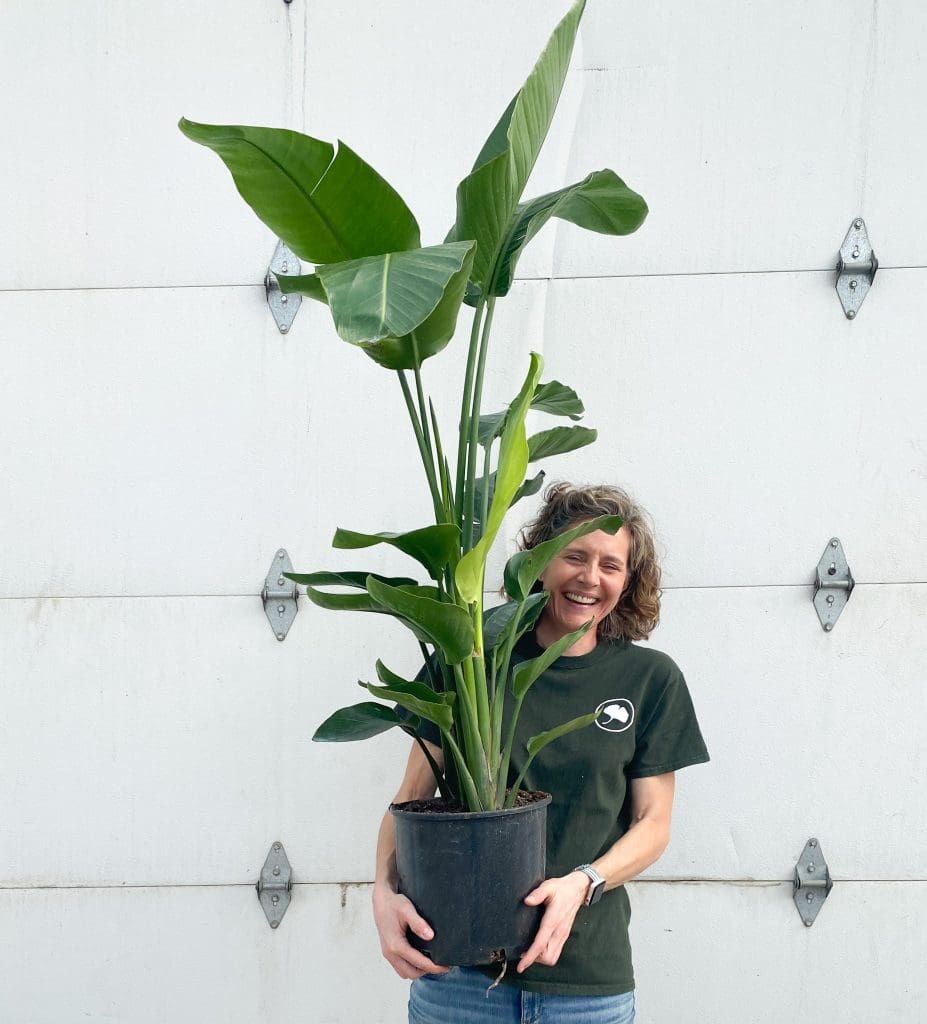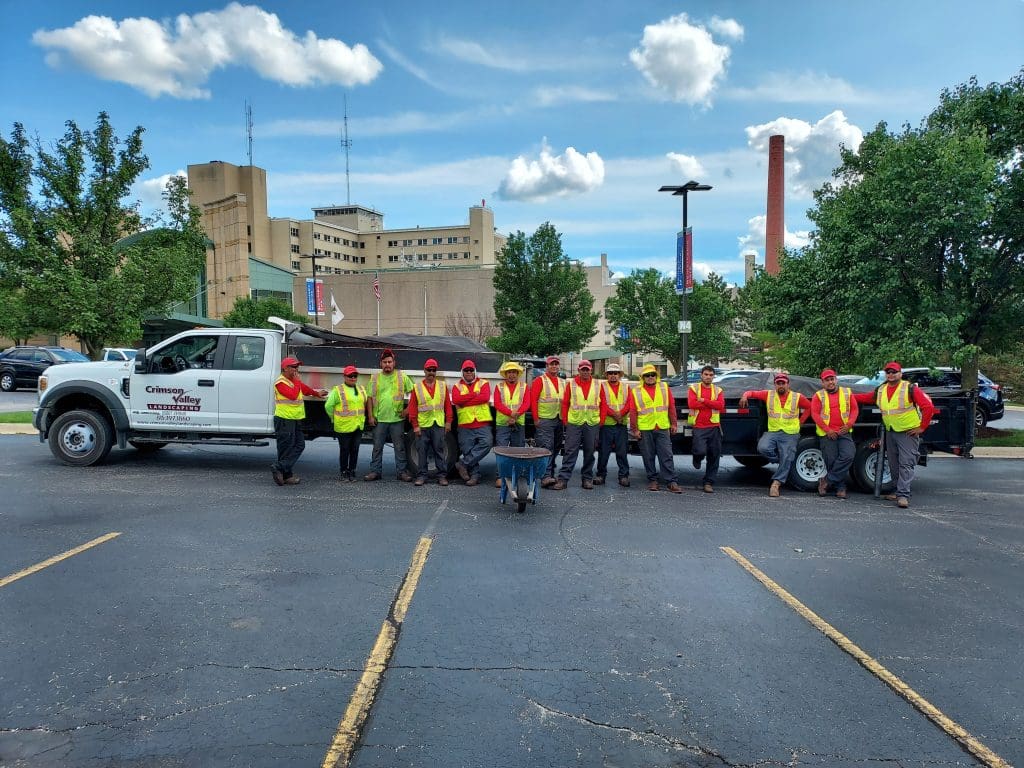
You’ve probably heard the quote, “If you build it, they will come.” This quote is particularly true when it comes to creating a landscape company that women want to work at.
“We have made sure to create a professional atmosphere that is attractive to anyone that wants to be involved with a successful company,” says Mike Sanders, president of Crimson Valley Landscaping, based in Rockford, Illinois. “The contracting field tends to be more male-dominated, and we have made sure to keep our doors open to all genders and are focused on hiring more women to our team each season.”

Teddy Russell, CEO of Russell Landscape Group, based in Sugar Hill, Georgia, notes the exponential growth that can occur when you add one female worker. As more women join your team, word of mouth can increase your numbers as more of them tell their friends.
“I frequently talk about my 16-year-old daughter who might want to have a career at Russell Landscape one day,” Russell says. “A goal of mine is that she feels comfortable and welcome with a substantial percentage of female team members. Currently, nine percent out of our 550 employees are females, which is around 50 team members. I am proud that one of our branch managers is a female. It has been rewarding to see the increase in female team members in her branch. It is also exciting for me that NALP has created an awareness that the landscape industry is a rewarding career for females. Over the past four or five years, we have seen more and more applicants who are females.”
At McHale Landscape Design Inc., based in Upper Marlboro, Maryland, women make up 14 percent of their workforce. Since adding their first female field worker in 2018, who has since become a star foreman, they have added more than a dozen field crews and continue to add more every year.

Poplar Point Studio, based in Moravia, New York, has a staff that is 85 percent female, and they credit this due to the nature of their work and creating a workplace that is inclusive and understanding to all, no matter the gender.
“We wanted to have a company that allows and encourages women to be part of the green industry and feel supported and comfortable,” says Alison Falkenburgh, container division manager/lead gardener for Poplar Point Studio. “By focusing on fine gardening, it naturally started attracting more females to the position. By having more women, it allows them to teach one another in a comfortable environment and support one another in ways that do not traditionally happen in a male-dominated industry.”
Stay True to Company Values
If you’re wanting to attract more women to your company, evaluate your company values and culture. Ask yourself if it is a place everyone would want to work. Companies like McHale and Crimson Valley say they’ve never had to actively start recruiting women; they’ve just selected the best-qualified person for the job.

“Our company culture is focused on making this a great place to come to work,” Sanders says. “Our team is very accepting and open to anyone that joins our team.”
McHale and Russell Landscape say treating all employees with equal respect is critical.
“I’ve found that if we just create that culture of making sure we have respect for the people who are doing their jobs well, most people aren’t thinking about gender or race,” Russell says. “The good thing is when you get put out in the trenches working in the heat, the people who end up doing a good job come together and bond.”
Kalee Robbins, maintenance division manager/lead gardener for Poplar Point Studio, says their culture is crucial for the successful retention of all their employees, regardless of gender.

“However, women generally enjoy and appreciate the positive, inclusive, open-minded and understanding nature that all existing employees and staff, no matter their role or division, exude on a daily basis,” Robbins says. “Our culture and moral values are expressed from the very first interaction an employee has with us, from their first inquiring email about potential employment. We have found historically, our hiring and onboarding process makes all the difference in attracting and retaining an employee that is a good fit for our present company and in the future.”
Culture is also one of the main attractors for Mulhall’s, based in Omaha, Nebraska. Meray Kim, engagement + training manager for the company, says one thing she loves is how they celebrate being a diverse group of people from all kinds of different backgrounds, generations, and cultures, each one bringing different skills, experiences, and expertise.
“The reason I wanted to join the team, aside from my love of plants, was for the culture – from everything I’ve seen, Mulhall’s seemed like a welcoming company,” says Kat Dover, office manager for Mulhall’s. “Since joining, I’ve had the opportunity to experience this for myself. Coming from a non-landscaping background, I’ve always felt encouraged to learn and be involved, even when it’s outside of my comfort zone. The support to grow personally and professionally here is unparalleled.”
Providing Mentoring and Leadership Opportunities
Aside from providing a respectful, welcoming workplace, investing in your female employees and empowering them to take on leadership roles is significant. Falkenburgh notes that seeing women in management positions helps other females feel welcomed and that they belong.

At McHale, they have many women in leadership positions, including their CFO, controller, operations manager, construction division manager, marketing director, HR director, and executive administrator.
“We’ve come a long way in giving the right person the opportunity to fill leadership roles,” says Dana Leehy, logistics manager for Mulhall’s. “As a hiring manager, I’ve had to catch myself in breaking my own gender biases, but the more objective we are, we have a better chance of finding the right person for the right role.”
Leehy adds that as long as you’re curious, work hard, and show up, the opportunities are available for anyone. Mentorships can also help set female employees up for success.
“We encourage our employees to strive for growth,” Julie Patronik, director of marketing and public relations for McHale. “Often, mentorship occurs naturally because we have many women in leadership roles. They are fully aware of the responsibilities that leadership positions demand and they welcome mentoring women that are new to the company.”
Dover says training has been a huge part of her experience at Muhall’s and their People Team gives the tools to be the best versions of themselves.

“Through Bloom Sessions, we pick up the skills to be leaders and are emboldened to challenge ourselves and our peers,” Dover says. “We’re also given space in our 1 on 1 meetings with our direct managers to have honest and productive conversations about our careers. It really feels like Mulhall’s is putting effort into all the right places to create a space where people can flourish.”
Leigh McGongale, CEO of Poplar Point Studio, says they do formal check-ins two to three times a season to set goals, check on those goals and discuss training and resources to advance a team member’s skills.
“I have done some intentional 1:1 mentoring with a few of our team members who have expressed interest in running their own business in the future,” McGonagle says. “I do make extra time to chat with those individuals, working through business concepts, sharing resources and helping them test out their ideas underneath our current business umbrella if possible. We’ve had one new business spin out from this coaching, and another team member leave and start their own business.”
Mindset Shifts
Because the landscape field has been traditionally a male field, women can be intimidated by this concept. There can also be the possible issue of your male employees not being supportive of women joining the industry. Both of these mindsets should be addressed if you want to successfully recruit and retain women on your team.
“Intimidation is normal and expected,” says Adrienne Stutz, Destin branch manager for Russell Landscape Group. “Our female managers empathize with them. Additionally, women with tenure on our team will work alongside new recruits to help them overcome and grow towards gaining the respect of the team.”

Sara Burks, branch administrator of Charleston, Savannah and Nashville for Russell Landscape Group, adds she makes a point to speak to each employee, female and male, and check in to make sure everyone is doing well. She says creating a great group atmosphere and speaking to everyone helps make sure all feel included and heard.
“When training or learning new skills, we find it very helpful to have both male and females teaching the training,” Falkenburgh says. “For some women, it is intimidating learning how to use equipment from men, so we like to make sure that there is the option to learn from a woman as well if that makes them feel comfortable.”
Patronik says they had a few male employees who were initially unsupportive of women in the field. However, they were quickly on board when they saw that women can do the same work, and some can even do it better.
“I think that maybe there’s a chance that sometimes females come in with a little chip on their shoulder too and say, ‘Hey, why don’t I just outwork you,’ and once you earn their respect, there’s really very little issue,” Russell says.

Robbins says they have to remind the men on the team sometimes that women have different bodies, which impacts the amount of mulch or stone they can take in a wheelbarrow.
“The men have been very supportive of the women team members and their strength levels; however, during mulch season, we do have to often remind them to not fill the wheelbarrows up as much for the women as the men,” Robbins says. “We make sure that the women (and the men) feel comfortable to say ‘that is enough’ and to not feel less than if they cannot take as much as the men or other women on the team.”
Access the NALP Foundation’s toolkits on the best ways to recruit and retain a diverse workforce.

